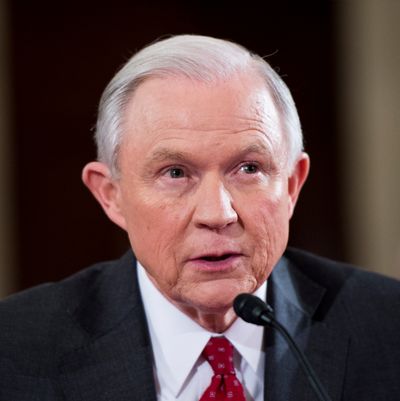
Days after the first indictments were handed down by Special Counsel Robert Mueller’s team, on Thursday a new round of revelations raised questions about what Attorney General Jeff Sessions knew about the Trump campaign’s Russia contacts. But despite Democrats’ calls for Sessions to clarify statements he made to Congress under oath, he probably shouldn’t be too worried – for now, at least.
During his Senate confirmation hearing in January, Sessions was asked by Senator Al Franken what he would do if evidence showed “anyone affiliated with the Trump campaign communicated with the Russian government in the course of this campaign.”
“I’m not aware of any of those activities,” Sessions answered. “I have been called a surrogate at a time or two in that campaign and I didn’t have — did not have communications with the Russians, and I’m unable to comment on it.”
Sessions testified before the Senate in June that he didn’t “recall” any meetings between campaign associates and Russian officials, and last month, responding to another question from Franken, Sessions denied knowledge of any Trump campaign surrogates communicating with the Russians. “I did not and I’m not aware of anyone else that did, and I don’t believe it happened,” he said.
However, court documents released this week in the Mueller investigation indicate that George Papadopoulos, who pleaded guilty to lying to the FBI, introduced himself at a March 31, 2016 campaign meeting by saying he “that he had connections that could help arrange a meeting between then-candidate Trump and President Putin.” A photo shows that both Trump and Sessions were present at the meeting.
On Thursday another former Trump foreign policy adviser, Carter Page, testified behind closed doors to the House Intelligence Committee that he told Sessions he was traveling to Russia during the campaign.
“Back in June 2016, I mentioned in passing that I happened to be planning to give a speech at a university in Moscow,” Page told CNN. “Completely unrelated to my limited volunteer role with the campaign and as I’ve done dozens of times throughout my life. Understandably, it was as irrelevant then as it is now. If it weren’t for the dodgy dossier and all the chaos that those complete lies had created, my passing comment’s complete lack of relevance should go without saying.”
These revelations sparked headlines suggesting that perjury charges for the attorney general may be on the table, and calling on lawmakers to start openly calling him a liar. Democratic Senators Richard Blumenthal and Patrick Leahy didn’t go that far, but they asked Sessions to “immediately come before the Senate Judiciary Committee to update your testimony and correct any omissions and any statements that may have been incorrect or misleading.”
Franken sent Sessions a letter on Thursday demanding that he explain his interactions with Papadopoulos in detail. “This is another example in an alarming pattern in which you, the nation’s top law enforcement officer, apparently failed to tell the truth, under oath, about the Trump team’s contacts with agents of Russia — a hostile foreign power that interfered in the 2016 election,” Franken wrote.
Franken cited reports that when Papadopoulos’s suggested arranging a meeting between Trump and Putin, several advisers shot down the idea – suggesting it’s the kind of exchange one might remember. Per the New York Times:
But Mr. Trump listened with interest and asked questions of Mr. Papadopoulos. Mr. Trump “didn’t say yes, and he didn’t say no,” said the former aide, who agreed to describe the meeting on the condition of anonymity.
Finally, Mr. Sessions, as the campaign’s top national security official, spoke vehemently against the idea, asking others not to discuss it again. Mr. Trump did not challenge him, the former aide said.
A “source familiar with the matter” offered a strange defense of Sessions to NBC News, suggesting that he may not remember the discussion, but did recall that the matter was settled once he shot down the idea. “The March 31 comments by this Papadopoulos person did not leave a lasting impression,” the source said. “As far as Sessions seemed to be concerned, when he shut down this idea of Papadopoulos engaging with Russia, that was the end of it and he moved the meeting along to other issues.”
The number of things Sessions does not recall about a foreign adversary’s interest in Trump’s campaign is bizarre. But despite what some on the left (and even the right) have suggested, brief discussions with two aides about contacts in Russia are not the smoking gun that lands Sessions in a jail cell.
Sessions made a far more implausible argument when he claimed that he forgot about as many as three meetings he had with Sergey Kislyak, the Russian ambassador to the United States, during the campaign – and that their chats may have covered policy matters. Yet, former federal prosecutors did not think even this was enough to successfully prosecute Sessions for perjury.
Members of the Senate Judiciary Committee should definitely be looking into the possibility that the attorney general lied to them under oath, but it doesn’t appear that they intend to go as far as perjury charges.
“The clarity of the question and the answer could be easily challenged,” Jonathan Turley, a professor at George Washington University law school, told Bloomberg. “It is rare to see cases for perjury to Congress generally because the exchanges are often imprecise or rather fluid in nature.”
More questioning from Democratic lawmakers is just another item for the list of humiliations Sessions has suffered in the Trump administration. He’s probably more concerned about being interviewed by Mueller, and the president deciding to refocus his ire on the AG whose recusal led to his appointment.






























